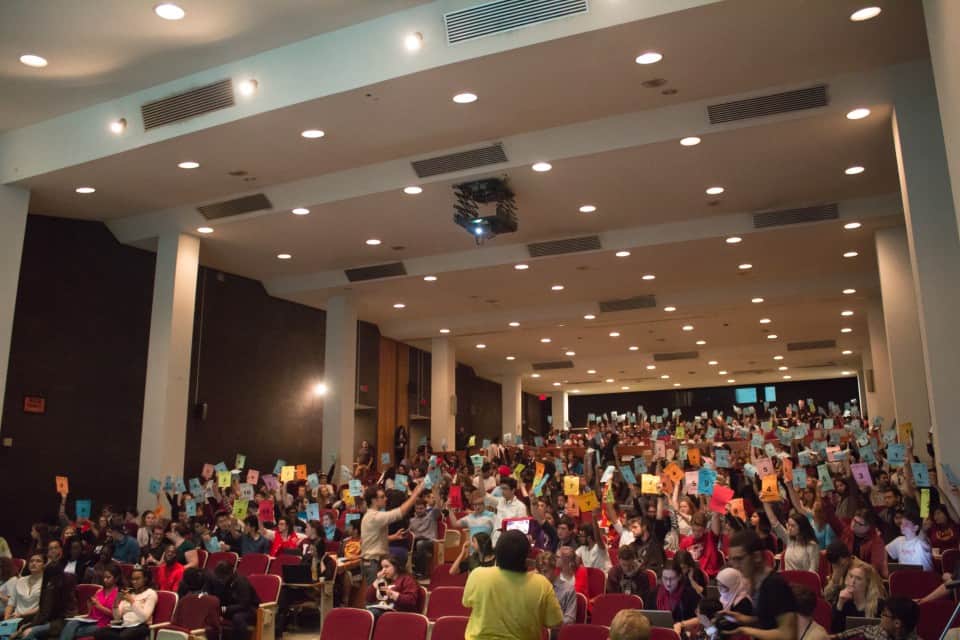Maybe it was all the samosas I ate, or the feeling in my knees after sitting down for four hours, but about halfway through the UTSU’s Annual General Meeting (AGM) I suddenly felt as though I was surging through the desert on a steam-punk-themed jeep in a scene directly out of Mad Max. Consider, if you will, what these two things have in common: a) wanton chaos, b) an unexpected musical guest, c) political disorganization, and d) a notably unsatisfying ending.
The lengthy meeting was more of a theatre production than it was anything else, so for the sake of critiquing our own form of governance, perhaps it is most fitting to write about the AGM in the form of a theatre review.
[pullquote]The lengthy meeting was more of a theatre production than it was anything else[/pullquote]
The UTSU’s performance of The AGM started comically late and went on far longer than was seemingly necessary. Act One was expected to hold an election of the board structure proposal, but it was almost two hours in before the agenda had even been approved. When the ‘intermission’ came around — initiated by a motion to recount the votes in what was clearly a decisive majority — students stood up, stretched, went to the bathroom, and awaited an election of the board structure that had still yet to arrive. If the wheels of democracy were turning, they were in desperate need of a tune-up.
The performance was also equipped with everything necessary to make up a mindlessly entertaining production — a gavel, a soundtrack, and a variety of Oscar-winning performances all made their dutiful appearances. Breaking traditional theatre customs, clapping was prohibited, and was instead replaced with a mysterious form of audience approval that the chair labeled as ‘spirit fingers.’
But what began as a comedy slowly transformed into tragedy, and what had looked hopeful at the beginning became increasingly futile as the play wore on. The problem lay not in the actors, nor the presentation, but rather in the lofty responsibility that the performance asked of its audience. In total, seventeen items were scheduled for the meeting, yet only four were actually completed. If the student body takes two hours before reaching the approval of the agenda, how can it possibly be expected to complete a whole seventeen items in one night?
Similarly, the performance lacked the much-needed co-operation that was required in order to complete these items. Plan B, one of two board structure proposals, was elected by a simple majority in the first round; however, it failed to meet the two thirds majority in the confirmation vote. Looking at the raised ballots, it was evident that most of those who had voted against the proposal in the first round had also opposed it in the second round. Rather than simply preferring Plan C to Plan B, the opposition was so unwilling to settle that they chose to leave the UTSU without any board structure whatsoever.
Naturally, democracy is intended to hold such obstacles, but it is moments like these that should encourage us to reconsider the power placed in our hands. What if Canadian citizens were expected to vote on the structure of Parliament? Aside from electing a local candidate, what if we were expected to vote on the amount of seats we had per contingency, and what each of these seats would be in charge of governing? While democracy is certainly integral to our student’s union, perhaps a direct democracy is not what we’re looking for.
Considering that merely some of the students participate in the AGM, only a small portion of us are deciding upon a structure that is wholly important for the larger student body. In situations like these, there is no time for misinformed voting, or for decision-making based on any reason other than to find the best solution possible for the UTSU.
The early days of American republicanism aimed to solve these sorts of problems and determined that a representative democracy would, for the most part, avoid such obstacles. This system would mitigate a tyranny of the majority, and more specific to this case, would allow for goal-oriented politicians to properly represent the values of their people. At some point, the power of policy-making must shift from the students to the people representing them. But as we currently stand, comparable to the Athenians when they first discovered democracy, the AGM remains little more than student theatre.
Jacob Lorinc is a third-year student at Innis College studying political science. He is The Varsity‘s Arts & Culture Editor.


